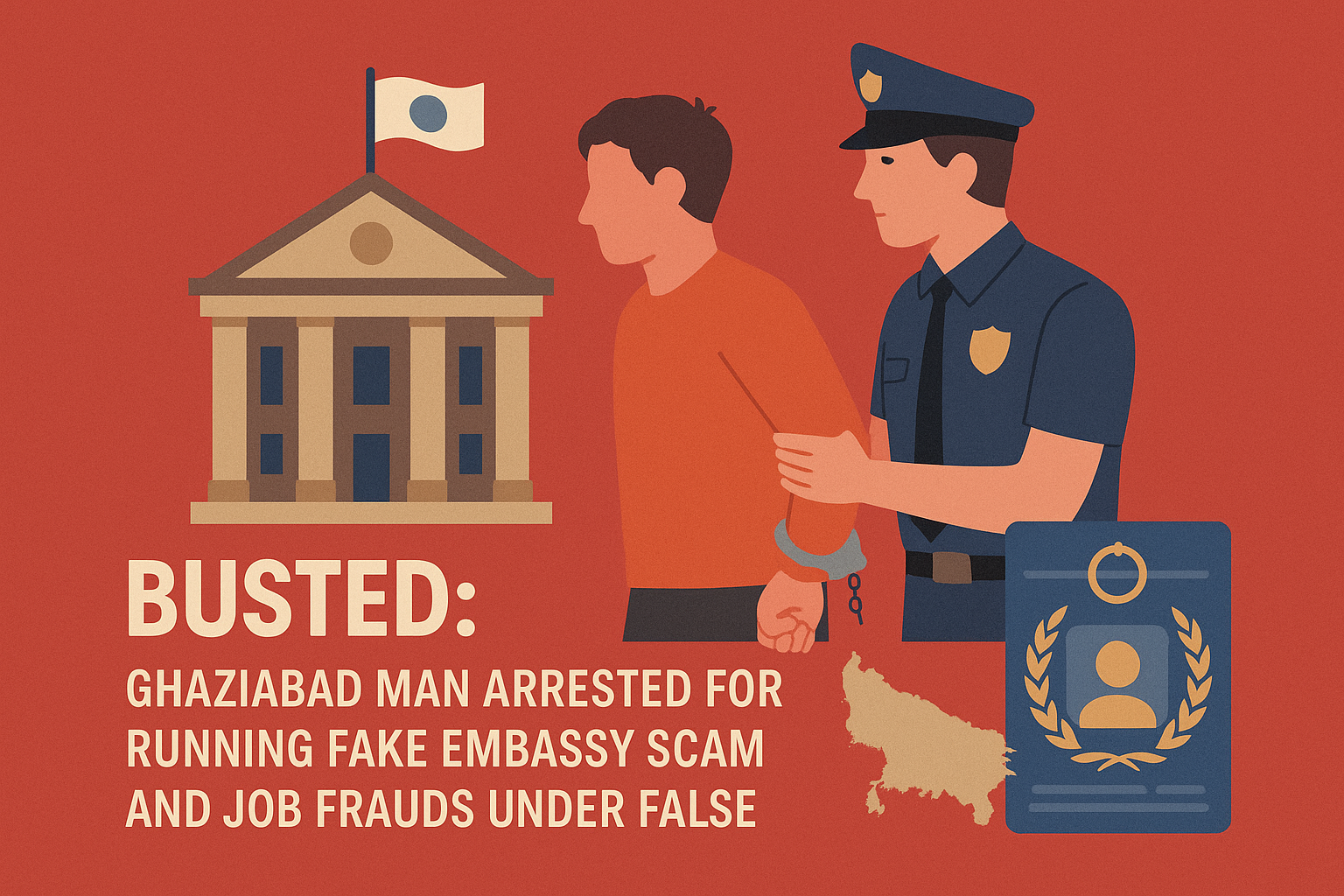On July 22, 2025, the Uttar Pradesh Special Task Force (STF) uncovered a significant diplomatic fraud operation that had been running under the guise of several non-existent nations, including "West Arctica," "Seborga," "Poulvia," and "Lodonia." The mastermind behind this elaborate scam, Harsh Vardhan Jain, was arrested in Ghaziabad, Uttar Pradesh. Operating from a rented bungalow in Kavi Nagar, Jain posed as the ambassador of these fictional nations, engaging in a series of fraudulent activities, including offering fake diplomatic services and running a job placement scam.
Authorities found that Jain had been using luxury vehicles with forged diplomatic number plates, fake Ministry of External Affairs seals, and even doctored photographs featuring high-ranking officials such as Prime Minister Narendra Modi. Jain's fake embassies were designed to deceive both citizens and businesses, using these tactics to build credibility and trust among potential victims.
Who Was Involved?
Harsh Vardhan Jain, the main suspect, has a checkered past. In 2011, he was implicated in a case involving the possession of an illegal satellite phone. Jain's connections to controversial figures, including godman Chandraswami and arms dealer Adnan Khashoggi, have only added to the intrigue surrounding his fraudulent empire.
Jain's arrest has led authorities to investigate his broader network of collaborators, suspecting that the scam may have involved other individuals engaged in similar deceptive activities.
When Did It Happen?
The scam was uncovered on July 22, 2025, following a tip-off to the STF, leading to a series of coordinated raids on Jain's properties. During the operation, investigators discovered crucial evidence of his elaborate fraud.
Where Did It Happen?
The scam was primarily orchestrated from a luxury house in Kavi Nagar, Ghaziabad, Uttar Pradesh. The rented bungalow served as the headquarters for Jain's operations, where he conducted meetings, issued forged documents, and displayed fake diplomatic vehicles to impress victims. Additionally, the operation spanned across various parts of India, with Jain allegedly offering overseas job placements and even engaging in hawala transactions through multiple shell companies.
Why Did It Happen?
Jain exploited the trust placed in diplomatic representatives to manipulate people into paying for fake services. His scam was two-pronged: he promised lucrative foreign job placements and used fake embassies to offer diplomatic privileges, including luxury vehicles with fake diplomatic plates and forged passports. Jain’s motivations appear to have been financially driven, aiming to profit from his victims' naivety while hiding behind a veneer of fake diplomacy.
The investigation suggests that Jain may have been running a hawala network, funneling money through shell companies, further complicating the fraud’s scope. He reportedly targeted those seeking job opportunities abroad, as well as those interested in acquiring fake diplomatic status.
How Did It Unfold?
The STF’s investigation uncovered a trove of incriminating evidence during the raid. Authorities seized a large sum of cash—approximately ₹44.7 lakh—along with foreign currency from multiple countries. In addition, the police recovered a total of 12 fake diplomatic passports, 34 counterfeit seals from various fictional nations and organizations, and two forged press cards. Four luxury vehicles with diplomatic number plates were also confiscated.
Jain had been using these forged documents and luxury items to attract attention, making his fake embassies appear legitimate. His targets included both individuals looking for fraudulent diplomatic recognition and businesses willing to engage in illicit operations.
As the investigation progresses, authorities are looking into Jain's connections and the full scale of his operation. They are also examining how many others might be involved in this scheme.
Impact and Response
The arrest of Harsh Vardhan Jain has sparked public outrage, as many were unknowingly lured into his scam. The operation has raised serious questions about the misuse of fake diplomatic credentials and the ease with which criminals can exploit societal trust for personal gain.
Law enforcement agencies are now working diligently to track down others who may have been complicit in the scam. There are growing concerns about the potential for similar schemes to emerge, prompting the need for more stringent checks and balances when dealing with diplomatic documentation and overseas job placements.
What’s Next?
As the investigation unfolds, the STF is focusing on uncovering the full extent of Jain’s operations, including identifying all potential collaborators. Authorities are also exploring links between this fraud and other related criminal activities, such as money laundering and hawala transactions.
For now, Jain remains in police custody as the STF digs deeper into his network, hoping to prevent further frauds of this scale from taking place.
Conclusion: A Cautionary Tale
The Ghaziabad embassy scam serves as a stark reminder of the lengths to which fraudsters will go to deceive people. This case underscores the importance of vigilance when dealing with job placements, diplomatic services, and the authenticity of official documents. As law enforcement continues to unravel the case, it is clear that the consequences of such frauds extend far beyond financial loss—they shake the very foundations of trust in international relations and diplomacy.


